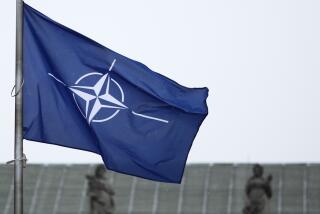Beef Up the Taliban’s Enemy
- Share via
Sunday, the Northern Alliance, the main Afghan opposition force, announced that it would welcome U.S. aid in its fight against the Taliban. We should seize this opportunity because even without Ahmed Shah Masoud, their commander who was assassinated last week, the alliance can play a crucial role in compelling the Taliban to disgorge Osama bin Laden and his operatives.
To coerce the Taliban into cooperating, the United States needs to send the message that unless the regime does so, the U.S. will smash its military power and threaten its control over Afghanistan. Getting it to take heed will be difficult, since years of sanctions and diplomatic isolation have made little impression. The U.S. must raise the stakes, and a good way to do so is by supporting the Taliban’s chief internal adversary.
The Northern Alliance is a confederation of tribal, ethnic, religious and other groups, many of which organized to fight the Soviet invasion of Afghanistan in the 1980s. It continues to resist the Taliban from the northeastern corner of the country, although it now controls perhaps only 5% of Afghan territory. Although the Northern Alliance has been ground down by the Taliban’s troops, it has not gone gently. If the U.S. were to provide it with weapons, ammunition and other supplies, in addition to training and intelligence, it might be able to reverse the tide of battle and eventually threaten Taliban control.
With access to bases in Pakistan or Central Asia, the United States could launch airstrikes and special forces operations to support Northern Alliance assaults. Washington could use an improved relationship with the alliance to learn about Bin Laden’s facilities and activities and perhaps use alliance bases to mount its own operations. And if the United States decided that its war on terrorism required the removal of the Taliban from power, here too the Northern Alliance would be its best bet.
The United States has had mixed success supporting insurgencies by foreign opposition groups in the past. But the failures have tended to be in cases in which the opposition groups were not a serious threat to existing regimes. There are four things an armed opposition needs to succeed: a willingness to fight and die even if no major power stands with them, the military capability to take on the regime’s forces, internal backing from sizable factions of the population and the support of at least one neighboring state. The Northern Alliance has all four; all it needs is U.S. support.
The Northern Alliance fighters have demonstrated considerable military prowess over 22 years of warfare. They are veterans of countless battles and have shown the determination to fight and, if necessary, die for their cause. Its 10,000 seasoned troops and commanders have withstood repeated assaults by larger and better-armed Taliban forces and have surrendered ground only grudgingly.
The alliance also has considerable internal support. The Taliban have imposed a harsh, idiosyncratic version of Islam on Afghanistan, and the movement is dominated by one community--the Pashtuns, who comprise less than 40% of Afghanistan’s population--to the exclusion of others. The Northern Alliance has long been the champion of this disenfranchised majority.
Finally, the Northern Alliance enjoys support in the region. Iran, Uzbekistan, Tajikistan and Russia already provide it with bases, arms and training, and if the United States can persuade Pakistan to cut its ties to the Taliban, the alliance might be able to open up a southern front as well.
Of course, support for the Northern Alliance will not be a silver bullet that solves all of the United States’ problems and will even bring some new ones. Masoud, their greatest commander, will be hard to replace, although another highly regarded fighter is likely to succeed him. And we will have to grapple with the fact that in the past the alliance has funded itself partly through the production and sale of opium). But if the U.S. is serious about taking down Bin Laden’s network, these are the kinds of allies it will need.
The Northern Alliance has demonstrated that it can stand up to the Taliban on the battlefield. We should provide them with the wherewithal to prevail.
More to Read
Sign up for Essential California
The most important California stories and recommendations in your inbox every morning.
You may occasionally receive promotional content from the Los Angeles Times.













